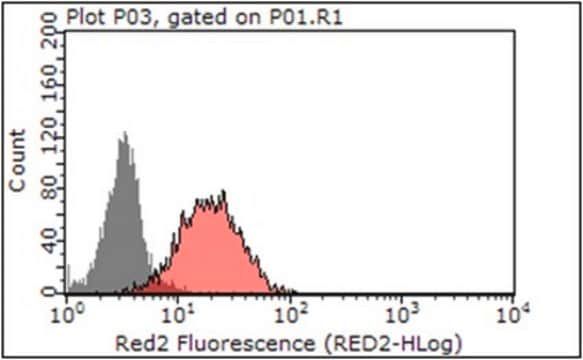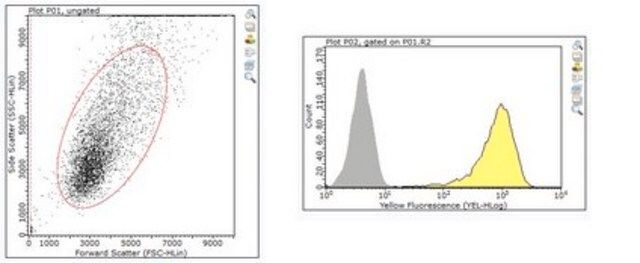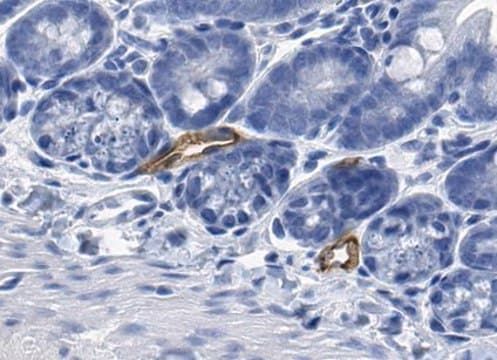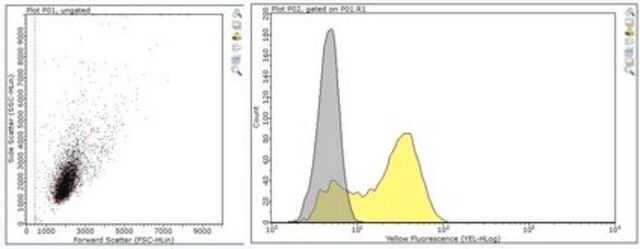MABF2072
Anti-MAdCAM-1 Antibody, clone MECA-367
clone MECA-367, from rat
Manufacturer: Sigma Aldrich
Synonym(S): Mucosal addressin cell adhesion molecule 1, mMAdCAM-1
Select a Size
| Pack Size | SKU | Availability | Price |
|---|---|---|---|
| 25 μG | MABF2072-25-μG | In Stock | ₹ 13,730.00 |
| 100 μG | MABF2072-100-μG | In Stock | ₹ 43,200.00 |
MABF2072 - 25 μG
In Stock
Quantity
1
Base Price: ₹ 13,730.00
GST (18%): ₹ 2,471.40
Total Price: ₹ 16,201.40
biological source
rat
antibody form
purified immunoglobulin
antibody product type
primary antibodies
clone
MECA-367, monoclonal
species reactivity
mouse
packaging
antibody small pack of 25 μg
technique(s)
immunohistochemistry: suitable (paraffin)neutralization: suitablewestern blot: suitable
isotype
IgG2aκ
NCBI accession no.
XP_006513356.1
UniProt accession no.
Q61826
Description
- General description: Mucosal addressin cell adhesion molecule 1 (UniProt: Q61826; also known as MAdCAM-1, mMAdCAM-1) is encoded by the Madcam1 gene (Gene ID: 17123) in murine species. MAdCAM-1 is a cell adhesion leukocyte receptor that helps to direct lymphocyte traffic into mucosal tissues including the Peyer patches and the intestinal lamina propria. It is highly expressed on high endothelial venules (HEV) of organized intestinal lymphoid tissues and mesenteric lymph nodes, and in the lamina propria of the intestine. Its expression is also observed in brain endothelioma cells and mucosal tissues during chronic inflammation. Aberrant expression of MAdCAM-1 has also been reported in the inflamed pancreas. MAdCAM-1 can bind both the integrin alpha-4/beta-7 and L-selectin and is involved in regulating both the passage and retention of leukocytes. It is synthesized with a signal peptide (aa 1-21), which is subsequently cleaved off in mature form. MAdCAM-1 has an extracellular domain (aa 22-109), a transmembrane domain (aa 365-385), and a cytoplasmic domain (aa 386-405). It also contains three Ig-like domains (aa 22-109; 110-227; 258-357) and a Mucin-like region (aa 221-257). Two isoforms of MAdCAM-1 have been described that are produced by alternative splicing. Both isoforms can adhere to integrin alpha-4/beta-7. Isoform 2 that lacks the mucin-like domain is believed to be specialized in supporting integrin alpha-4/beta-7-dependent adhesion strengthening, independent of L-selectin binding. Interaction between integrin alpha 4 and MAdCAM-1 is considered to be important for the homing of diabetogenic T cells to the pancreas. (Ref.: Savinov, AY., et al. (2003). J. Exp. Med. 197(5); 643-656; Rivera-Nieves, J., et al. (2005). J. Immunol. 174(4); 2343-2352).
- Specificity: Clone MECA-367 detects Mucosal addressin cell adhesion molecule 1 (MAdCAM-1) in murine cells.
- Immunogen: Endothelial cells isolated from BALB/c mouse mesenteric and peripheral lymph nodes.
- Application: Anti-MAdCAM-1, clone MECA-367, Cat. No. MABF2072, is a rat monoclonal antibody that detects murine Mucosal addressin cell adhesion molecule 1 (MAdCAM-1) and has been tested for use in Immunohistochemistry (Paraffin), Inhibition/Function assays, Neutralizing, and Western Blotting.
- Quality: Evaluated by Immunohistochemistry (Paraffin) in mouse colon tissue sections.Immunohistochemistry (Paraffin) Analysis: A 1:50 dilution of this antibody detected MAdCAM-1 in mouse colon tissue sections.
- Target description: 43.65 kDa calculated.
- Physical form: Format: Purified
- Storage and Stability: Stable for 1 year at -20°C from date of receipt.Handling Recommendations: Upon receipt and prior to removing the cap, centrifuge the vial and gently mix the solution. Aliquot into microcentrifuge tubes and store at -20°C. Avoid repeated freeze/thaw cycles, which may damage IgG and affect product performance.
- Other Notes: Concentration: Please refer to lot specific datasheet.
- Disclaimer: Unless otherwise stated in our catalog or other company documentation accompanying the product(s), our products are intended for research use only and are not to be used for any other purpose, which includes but is not limited to, unauthorized commercial uses, in vitro diagnostic uses, ex vivo or in vivo therapeutic uses or any type of consumption or application to humans or animals.
Compare Similar Items
Show Difference
biological source: rat
antibody form: purified immunoglobulin
antibody product type: primary antibodies
clone: MECA-367, monoclonal
species reactivity: mouse
packaging: antibody small pack of 25 μg
technique(s): immunohistochemistry: suitable (paraffin)neutralization: suitablewestern blot: suitable
isotype: IgG2aκ
NCBI accession no.: XP_006513356.1
UniProt accession no.: Q61826
biological source:
rat
antibody form:
purified immunoglobulin
antibody product type:
primary antibodies
clone:
MECA-367, monoclonal
species reactivity:
mouse
packaging:
antibody small pack of 25 μg
technique(s):
immunohistochemistry: suitable (paraffin)neutralization: suitablewestern blot: suitable
isotype:
IgG2aκ
NCBI accession no.:
XP_006513356.1
UniProt accession no.:
Q61826
biological source: mouse
antibody form: purified immunoglobulin
antibody product type: primary antibodies
clone: 509-6, monoclonal
species reactivity: rabies virus
packaging: antibody small pack of 25 μg
technique(s): ELISA: suitableflow cytometry: suitableneutralization: suitable
isotype: IgG2aκ
NCBI accession no.: __
UniProt accession no.: __
biological source:
mouse
antibody form:
purified immunoglobulin
antibody product type:
primary antibodies
clone:
509-6, monoclonal
species reactivity:
rabies virus
packaging:
antibody small pack of 25 μg
technique(s):
ELISA: suitableflow cytometry: suitableneutralization: suitable
isotype:
IgG2aκ
NCBI accession no.:
__
UniProt accession no.:
__









